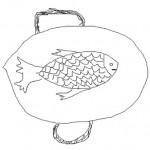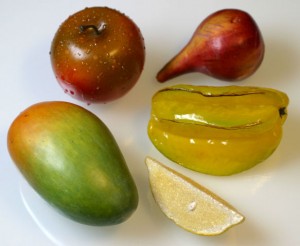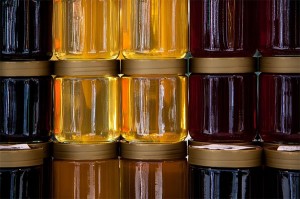Employees of the Jewish Museum Berlin respond:
“When I think back, I remember first of all friends and family, followed by food – a whole lot of food.” Roland Schmidt, Host
“I remember the meals at my grandmother’s as so sumptuous and sprawling that I had the feeling I needed to fast not just on Yom Kippur but for the whole rest of the year.” Alina Gromova, Academic Employee in the Fellowship Program, and Guide

© Alina Gromova, Jewish Museum Berlin
“To stay on the culinary topic, I can bring up the days when gefilte fish was still cooked at home. You would order two carp at the fishmonger – who was doing enough business in September to last the entire year, because the customers celebrating Rosh ha-Shanah would stand in line for live fish. You would carry home the floundering content in a metal bucket on the tram, accompanied by the cold glares of ditrustful animal rights activists sitting near you. → continue reading

Apple, mango, fig, star fruit, lemon
We posed this question to employees of the Jewish Museum Berlin. Some answered curtly, such as one colleague who “doesn’t usually do anything (aside from dipping a few pieces of apple in honey…).” Others answered indirectly via an out-of-office message which ended with “Cordial greetings and Shanah Tovah.” Here are some additional responses:
“I’m going to go to my grandmother’s for Rosh ha-Shanah, like every year. With one difference: I’m hoping that she will follow my advice this year and forget to warm up the gefilte fish before serving it, because it tastes better cold.” Alina Gromova, Academic Employee in the Fellowship Program, and Guide

Honey, source: Pixabay, CC0 license
“Like every year, we observe erev Rosh ha-Shanah at a dinner with friends, which we sanctify by reciting various blessings. We dip apples in honey and buy rare fruit which relinquish their mysteries upon consumption. We celebrate the New Year culinarily, with new, unknown foods to discover, resulting in a kind of biology intelligence test. Unfortunately there are never any kreplach to follow because no one knows how to prepare them anymore, and the gefilte fish comes, if at all, out of a jar. Making it would take days, but worse, cooking fish gives off a smell which fills the entire house, and might drive away the neighbors, and not only the disagreeable ones… The remaining array of dishes is unspectacular. Over the next two days, some of the dinner guests attend synagogue – chosen either out of nostalgia for childhood memories, or out of liturgical interest.” Cilly Kugelmann, Program Director → continue reading
During the week of 21 to 27 October 2013, the Academy of the Jewish Museum Berlin, in cooperation with Kulturkind e.V., will host readings, workshops, and an open day for the public with the theme “Multifaceted: a book week on diversity in children’s and young adult literature.” Employees of various departments have been vigorously reading, discussing, and preparing a selection of books for the occasion. Some of these books have already been introduced here over the course of the last weeks.

Unlike German literature for young adults, the range of children’s books on the subject of diversity is still marginal. Usually books about diversity are transposed to the animal kingdom, or they depict ‘alien’ cultures by having foreign children invite their German school friends to an ethnic celebration. The Jewish Passover holiday, the Muslim Eid-al-Fitr, or, alternatively, the Chinese New Year, are described with one and the same formula: mom prepares the celebratory meal, dad explains the origins of the holiday, and the kids watch the central rites until they have to go to bed. Most of these books have no real plot.
Ingke Brodersen chose a different approach: she tells her story from the perspective of a little boy named Sascha, who emigrated from Russia to Berlin. → continue reading



